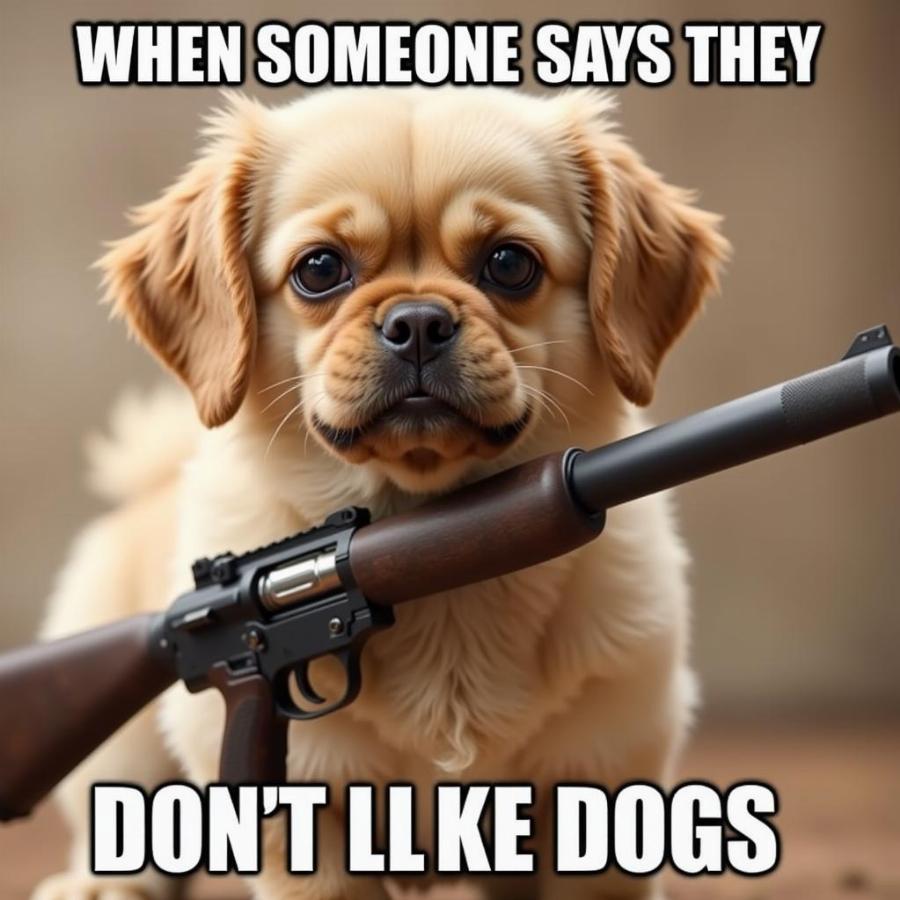The phrase “dog with a gun” often sparks strong reactions and conjures vivid imagery. While it might seem like an unusual topic for Beaut Dogs, it’s crucial to address the complex issues this phrase represents, especially within the context of responsible dog ownership and online trends.
This article delves into the reasons behind the popularity of the phrase “dog with a gun”, examines the potential dangers of associating dogs with weaponry, and emphasizes the importance of responsible pet ownership to ensure the safety and well-being of both animals and humans.
Decoding the “Dog with a Gun” Phenomenon
The phrase “dog with a gun” can be interpreted in various ways, contributing to its online prevalence.
- Figurative Language: Often, the phrase is used metaphorically to express a sense of irony, absurdity, or impending chaos. It can represent a situation spiraling out of control or highlight the unexpected nature of events.
- Humorous Content: The internet is awash with memes and jokes using the “dog with a gun” imagery for comedic effect. This often plays on the juxtaposition of a beloved pet with a dangerous object, creating a sense of ridiculousness.
- Political Commentary: Sadly, the phrase sometimes surfaces in political discourse, often symbolizing perceived threats or used as a tool for fear-mongering. It’s crucial to approach such instances with critical thinking and engage in respectful dialogue.
 Dog With Gun Meme
Dog With Gun Meme
The Dangers of Associating Dogs with Weapons
While the phrase “dog with a gun” might seem harmless in some contexts, it’s crucial to acknowledge the potential dangers of associating dogs with weapons:
- Normalizing Violence: Connecting dogs, often seen as symbols of loyalty and companionship, with firearms can inadvertently normalize the idea of violence. This is particularly concerning given the influence of online trends on younger audiences.
- Misinterpreting Dog Behavior: Attributing aggressive or threatening behavior to dogs, especially when linked with weapons, can lead to misunderstandings and fear. This can result in negative interactions between dogs and humans and potentially contribute to the misconception of certain breeds as inherently dangerous.
- Animal Cruelty: In extreme cases, the association of dogs with weapons can inspire acts of animal cruelty or neglect. It’s crucial to remember that dogs are sentient beings deserving of our care and protection, not tools for violence or intimidation.
Promoting Responsible Dog Ownership
As advocates for dogs, it’s our responsibility to promote responsible pet ownership and counter any narratives that portray dogs in a negative light. Here’s how we can make a difference:
- Educate Yourself and Others: Understand dog behavior and learn to interpret canine body language accurately. Share this knowledge with others, dispelling myths and promoting positive interactions.
- Practice Responsible Training: Enroll your dog in obedience classes and provide consistent training that emphasizes positive reinforcement. A well-trained dog is a joy to be around and helps foster a harmonious relationship between pets and people.
- Advocate for Animal Welfare: Support organizations working to protect animals from abuse and neglect. Report any instances of animal cruelty to the appropriate authorities.
Moving Beyond the “Dog with a Gun” Narrative
Instead of perpetuating potentially harmful associations, let’s focus on celebrating the incredible bond between humans and dogs. Let’s use our voices to advocate for their well-being and ensure that they continue to enrich our lives as beloved companions.
Remember, a dog’s place is by our side, not wielding a weapon. Let’s work together to create a world where dogs are valued for their loyalty, intelligence, and unwavering capacity for love.
Frequently Asked Questions
Q: Is it ever appropriate to use the phrase “dog with a gun”?
A: While the phrase can be used satirically or metaphorically, it’s important to be mindful of the context and potential for misinterpretation.
Q: How can I help stop the spread of harmful stereotypes about dogs?
A: Educate yourself about responsible dog ownership, challenge negative stereotypes when you encounter them, and share positive stories about dogs with others.
Q: What should I do if I witness animal cruelty or neglect?
A: Contact your local animal control or law enforcement agency immediately.
For more information on dog training, responsible pet ownership, and advocating for animal welfare, visit our resources page on Beaut Dogs.
Need further assistance? Reach out to our team at [email protected]. Beaut Dogs is here to help you navigate the world of dog ownership with confidence and compassion.